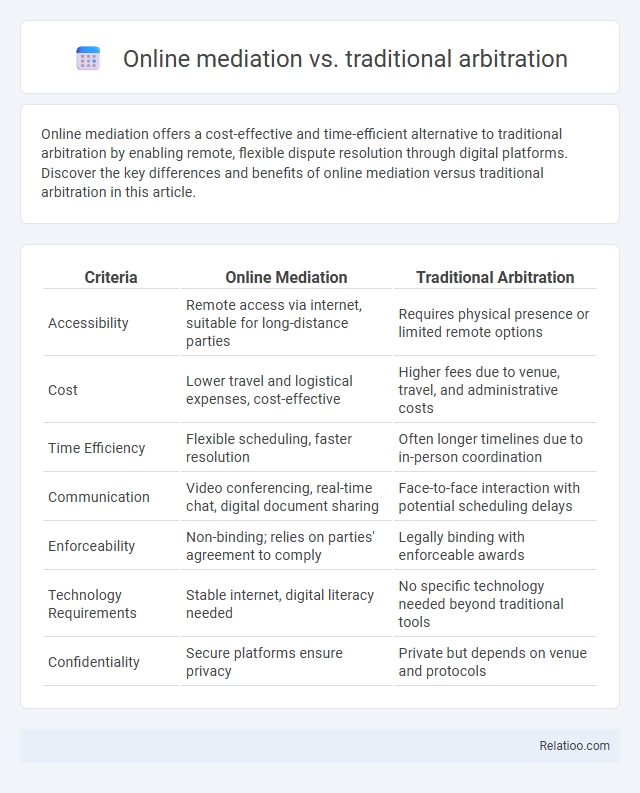Online mediation offers a cost-effective and time-efficient alternative to traditional arbitration by enabling remote, flexible dispute resolution through digital platforms. Discover the key differences and benefits of online mediation versus traditional arbitration in this article.
Table of Comparison
| Criteria | Online Mediation | Traditional Arbitration |
|---|---|---|
| Accessibility | Remote access via internet, suitable for long-distance parties | Requires physical presence or limited remote options |
| Cost | Lower travel and logistical expenses, cost-effective | Higher fees due to venue, travel, and administrative costs |
| Time Efficiency | Flexible scheduling, faster resolution | Often longer timelines due to in-person coordination |
| Communication | Video conferencing, real-time chat, digital document sharing | Face-to-face interaction with potential scheduling delays |
| Enforceability | Non-binding; relies on parties' agreement to comply | Legally binding with enforceable awards |
| Technology Requirements | Stable internet, digital literacy needed | No specific technology needed beyond traditional tools |
| Confidentiality | Secure platforms ensure privacy | Private but depends on venue and protocols |
Introduction to Online Mediation and Traditional Arbitration
Online mediation utilizes digital platforms to facilitate negotiation between disputing parties, providing a flexible, cost-effective alternative to traditional arbitration. Traditional arbitration involves a formal, legally binding decision made by an arbitrator after a structured hearing, often resembling courtroom procedures. Your choice depends on whether you prefer the informal, collaborative resolution of online mediation or the authoritative, final judgment offered by traditional arbitration.
Definition and Core Concepts
Online mediation involves a neutral third party facilitating communication between disputing parties through digital platforms to reach a voluntary agreement, emphasizing collaboration and confidentiality. Traditional arbitration is a binding process where an arbitrator reviews evidence and issues a decision, resembling a private court proceeding with formal rules and enforceable outcomes. Your choice between these dispute resolution methods depends on factors like desired formality, control over the outcome, time, and cost efficiency.
Process Overview: How Each Method Works
Online mediation involves a neutral third party facilitating communication between disputing parties through digital platforms to reach a mutually acceptable agreement, typically involving video conferencing and secure document sharing. Traditional arbitration requires a neutral arbitrator who listens to evidence and arguments in a formal setting, then makes a binding decision based on established rules similar to a court trial. Dispute resolution generally starts with negotiation, and if unresolved, parties may opt for mediation or arbitration, each varying in formality, cost, and time efficiency depending on whether the process is conducted online or in-person.
Accessibility and Convenience
Online mediation offers unparalleled accessibility by enabling parties to engage from any location with internet access, eliminating travel costs and scheduling conflicts commonly associated with traditional arbitration. Traditional arbitration, while providing structured dispute resolution, often requires physical presence and can entail complex scheduling and higher expenses. Dispute resolution through online platforms enhances convenience by allowing flexible timing and real-time communication, making it an efficient alternative to the rigid frameworks of conventional arbitration.
Cost Comparison: Online vs. Traditional Approaches
Online mediation typically offers lower costs compared to traditional arbitration due to reduced administrative fees and the elimination of travel expenses, making it a budget-friendly option for dispute resolution. Traditional arbitration involves higher costs stemming from venue rentals, arbitrators' fees, and extended timeframes, which can increase Your overall expenses substantially. Choosing online mediation can significantly decrease financial burdens while maintaining effective resolution outcomes.
Speed and Efficiency of Resolution
Online mediation significantly reduces resolution time by enabling virtual communication and flexible scheduling, leading to faster settlements compared to traditional arbitration and dispute litigation. Traditional arbitration, while more structured than mediation, involves formal procedures that can extend timelines but still often resolve disputes faster than court trials. Dispute litigation typically experiences the longest delays due to court backlogs and procedural complexities, making it the least efficient in terms of speed and resolution time.
Confidentiality and Security Concerns
Online mediation offers enhanced confidentiality with encrypted communication platforms ensuring Your sensitive information remains secure, unlike traditional arbitration which may involve physical settings vulnerable to unauthorized disclosures. Traditional arbitration often relies on formal procedures and in-person hearings, increasing the risk of data breaches or unintentional leaks compared to the controlled digital environment of online mediation. Dispute resolution processes prioritize confidentiality, but online mediation's advanced security protocols typically provide superior protection against cyber threats and maintain strict privacy standards.
Flexibility and Adaptability in Dispute Resolution
Online mediation offers unparalleled flexibility by allowing parties to engage from any location and schedule sessions at convenient times, enhancing adaptability in dispute resolution. Traditional arbitration typically involves fixed venues and tighter schedules, which can limit responsiveness to participants' needs and circumstances. Dispute resolution methods that prioritize flexibility and adaptability lead to faster settlements and increased satisfaction among involved parties.
Outcome Enforceability and Legal Standing
Online mediation offers a flexible, cost-effective approach with outcomes that rely on mutual agreement but require additional legal steps for enforceability. Traditional arbitration provides legally binding decisions with strong enforceability and recognized legal standing, ensuring finality in disputes. Your choice depends on the desired balance between informal resolution and formal legal enforceability in dispute outcomes.
Choosing the Right Approach for Your Dispute
Choosing the right approach for your dispute depends on factors such as cost, time, and privacy requirements. Online mediation offers a flexible, cost-effective, and confidential resolution process, ideal for parties seeking collaborative solutions without extensive legal formalities. Traditional arbitration provides a more structured and legally binding outcome but typically involves higher costs and longer timelines compared to online methods.

Infographic: Online mediation vs traditional arbitration
 relatioo.com
relatioo.com